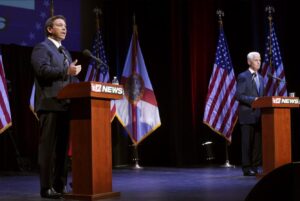
As early voting continues in the Sunshine State, here’s a breakdown of Florida’s gubernatorial candidates and why the midterm elections are not to be taken lightly.
The Democratic challenger, Charlie Crist, is a former member of the Republican Party. He served as governor of Florida from 2007-2011.
During his tenure as governor, he held firm conservative views on gun rights and capital punishment but was also an advocate of healthcare reform, vetoed laws restricting a woman’s right to choose and championed for the voting rights of non-violent ex-felons to be restored.
After deciding to run for U.S. Senate instead of re-election as governor and falling to Marco Rubio in the Republican primary, Crist announced his decision to run as an independent candidate. Eventually, in December 2012, he announced his switch in party affiliation to the Democratic Party.
Gov. Ron DeSantis assumed office in January. 2019 after winning by a narrow margin over Democratic candidate Andrew Gillum, a former Tallahassee mayor.
During his time as governor, he has signed the Parental Rights and Education Act, known by some as the “Don’t Say Gay” bill. The bill bars instruction on things like sexual orientation and gender identity in public school classrooms through the third grade.
DeSantis has also secured funding to raise the minimum wage for Florida teachers and signed legislation to allow college student-athletes to be paid for their name, image and likeness.
The Republican incumbent and Democratic challenger faced off in debate on Oct. 24, where they spared no time being critical of each other. While Crist was critical of DeSantis for signing a law that bans abortions at 15 weeks with no exceptions for rape or incest and not clarifying if he has his eyes set on the White House in 2024, DeSantis was critical of Crist for supporting President Biden’s policies that have been tied to substantial inflation.
The midterm elections are certainly making headlines nationwide, particularly because of DeSantis’ high profile in the Republican Party.
“States have huge amounts of power on deciding issues so that’s where a lot of the political action is happening. That’s where you can see desired changes on issues like abortion,” Lonna Atkeson, a political science professor at Florida State University, said.
Nathan Francis, a political science professor at Florida A&M University, believes DeSantis has capitalized on Hurricane Ian and his response to last month’s devastating storm.
“As we saw in the aftermath of Hurricane Ian, Governor DeSantis was front and center in the state’s response and has generally received praise for how he’s handled the recovery so far. Proximity to problems and more direct knowledge about citizens’ needs allows for — and in fact demands — quicker responses,” Francis said.
Francis added that college students should be aware of the power they hold in any election.
“College students are a sleeping giant when it comes to voting,” he said.
The Famuan reached out to both campaigns for their comments to college-aged voters.
“The next generation of Floridians deserve a governor who cares about their future, who expands basic human freedoms, like the freedom to make decisions about our own bodies and love whomever they choose. I’m running for governor to unite our state and I know that young people in Florida are tired of division and cynicism and will send a message to Ron DeSantis on Nov. 8,” Crist said.
While the DeSantis campaign did not respond, in 2020 DeSantis invested over $124 million in education and research to Florida HBCUs and secured over $40 million in school hardening grants statewide.
Election day is Nov. 8 and DeSantis holds a strong lead in the polls.